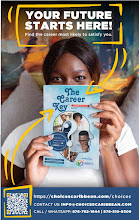
Whether you are graduating from fifth form, sixth form or from college or university, “leaving” brings with it a mixed bag of emotions. On the one hand you are pleased and proud of your achievements, but at the same time there is invariably a feeling of uncertainty, maybe even a tinge of fear. “What will happen next?” “What is the best path for me to take?” “Should I continue studying? How will I find a job?”
The many decisions and choices you face can be quite overwhelming as you try to balance your desires with financial and familial issues, peer influences and the urgent need to ensure that you are on the best and correct career path for your life.
Making good decisions about your life, educational and career path involves several factors including:
· knowing yourself and being clear about what you really want to achieve
· knowing your options and how to put these in place
· accessing the necessary information and having the formula, knowledge and ability to make sound decisions
Intensive research conducted by various outstanding scientists has identified the important factors in making good, quality decisions. Dr. Lawrence Jones has condensed and simplified the process into four steps.
These four steps form the acronym ACIP. Following these steps will ensure that you make the best decisions possible. Beware of the temptation to skip any of the steps, as the more steps you leave out, the greater the likelihood of your regretting the decision you make later on.
STEP 1 - Alternatives
When making an important decision, always consider all your options. Whether this relates to choosing an occupation, an educational path or any other general decision, freely and thoroughly explore all possibilities. Get advice from others. Ask them for suggestions, and don’t just ask your friends; Speak with your mentor - if you have one - your teacher or a guidance counsellor. Brainstorm. Be imaginative.
STEP 2 - Consequences
Once you narrow down your alternatives to those that seem best to you, then weigh the pros and cons of each alternative. Research shows that you need to consider four types of consequences. So, for each alternative that you are considering create a "Decision Balance Sheet" and write down:
The gains and losses to yourself.
The gains and losses to significant others in your life such as parents, other family members, close friends, teachers or community, social, political or religious groups you value or are associated with.
Whether you would approve or disapprove of yourself, if you chose this alternative.
Whether the important people in your life would approve or disapprove of your choice.
STEP 3 - Information
In this step you research and accumulate more information about the alternatives you are considering, which you can add to your decision balance sheet as well as new facts that either support or change the pros and cons you wrote down.
Use all the resources available to you - the internet, the library, career counsellors, persons who are working in the career field that you are interested in, teachers, mentors ….. etc. Get your information from all relevant sources, always ensuring of course that the sources are knowledgeable and trustworthy.
Never, ever neglect this step in decision making. You cannot have too much information on the career you’re interested in.
STEP 4 - Plans
Once you have made your choice, it's time to start planning. Your first step is to ensure that you
1. make detailed plans for putting your choice into action
2. make contingency plans for handling any negative consequences that might arise from your choice
Planning and timing are the keys to success in any aspect of your life. A plan represents your intention, your focus and your desire. It is a reference that can keep you steady in those times when you may become a little derailed, and therefore should be clearly written down and reviewed regularly not only because you may and probably will make changes to it, but more importantly because reviewing it will keep you focused and centred on your goals and what you want to achieve.
Excerpted from The Graduates’ Guide to Making The Best Decisions For Your Career, Education & Life, a publication of CHOICES Career Advice. E-mail <info@choicesonlinejm.com> for information or go to www.choicesonlinejm.com.

.JPG)
.JPG)











0 comments:
Post a Comment